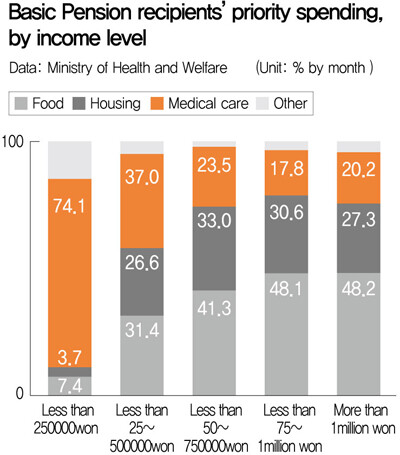hankyoreh
Links to other country sites 다른 나라 사이트 링크
Basic pension a success, but elderly poverty still a serious problem

One year after the basic pension program was launched, recipients are highly satisfied with the program, a survey found. This illustrates just how important a role basic pension plays in welfare for the elderly. However, experts believe that reform is needed in a wide range of areas before real progress can be made in resolving elderly poverty.
Basic pension provides a minimum of 100,000 won (US$88) and a maximum of 200,000 won (US$176) to people 65 years and above who fall within the lowest 70% of income earners.
The Park Geun-hye government changed the previous Elderly Pension System to the current Basic Pension System, which went into effect one year ago.
On July 7, the Ministry of Health and Welfare announced the results of a questionnaire on the social effect of basic pension that it conducted with 2,000 recipients last month, one year after the program began. 92.5% of respondents said that basic pension was helping them in their daily lives.
Basic pension was generally used to pay for food (40.2%), housing (29.9%), and medical expenses (26.5%). However, there were big differences in how recipients used their pension payments according to their income level. The lower the income, the more of their pension went to pay medical bills.
Low-income earners - those making less than 250,000 won (US$220) a month - used 74.1% of their basic pension to pay medical expenses. In contrast, high-income earners - those making more than 1 million won a month (US$880) - only spent 20.2% of their pension on medical bills.
Of various changes that had occurred since receiving basic pension, respondents gave the highest score (3.7 out of 5 possible points) to the fact that seeing the doctor was less of a burden.
This is why experts say that, for the basic pension to make a real difference in elderly welfare, medical coverage should be increased for low-income earners.
A woman surnamed Kim, 66, who has been living at a nursing home for the past three years receiving treatment for Parkinson’s disease, spends the majority of the national pension (300,000 won) and basic pension (200,000 won) that she receives each month on her medical bills (400,000 won).
“Thanks to the national pension, I can pay my medical expenses without asking my children for help, but I don’t have enough money left over for other expenses,” Kim said.
“In terms of stages of the lifecycle, the thing that people spend the most on during their retirement is medical costs. But only one quarter of the poor have their medical costs completely covered by the government. Since the rest of the poor are enrolled in national medical insurance, basic pension cannot improve the quality of life of the elderly by itself unless national health insurance coverage is increased,” said Yu Won-seop, professor of preventative medicine at Chungnam National University.
As of the end of 2014, around 4.35 million people, or 66.8% of all elderly people in South Korea, were receiving basic pension. If people enrolled in special occupational pensions are excluded, 69.6% of the elderly are eligible to receive basic pension. 93.2% of these receive the full amount (202,600 won for individuals and 324,160 won for couples).
There is likely to be a bigger push to address the fact that the poorest of the elderly are basically unable to fully enjoy the benefits of basic pension because it is linked to the payment of the Basic Livelihood Benefits (support for people in the lowest income bracket). Since basic pension is regarded as income, it is subtracted from the allowance that is disbursed to those enrolled in the basic livelihood allowance program. As a result, an estimated 400,000 individuals technically receive basic pension but don‘t get to keep it.
By Park Su-ji, staff reporter
Please direct questions or comments to [english@hani.co.kr]

Editorial・opinion
![[Column] Has Korea, too, crossed the Rubicon on China? [Column] Has Korea, too, crossed the Rubicon on China?](https://flexible.img.hani.co.kr/flexible/normal/500/300/imgdb/original/2024/0419/9317135153409185.jpg) [Column] Has Korea, too, crossed the Rubicon on China?
[Column] Has Korea, too, crossed the Rubicon on China?![[Correspondent’s column] In Japan’s alliance with US, echoes of its past alliances with UK [Correspondent’s column] In Japan’s alliance with US, echoes of its past alliances with UK](https://flexible.img.hani.co.kr/flexible/normal/500/300/imgdb/original/2024/0419/2317135166563519.jpg) [Correspondent’s column] In Japan’s alliance with US, echoes of its past alliances with UK
[Correspondent’s column] In Japan’s alliance with US, echoes of its past alliances with UK- [Editorial] Does Yoon think the Korean public is wrong?
- [Editorial] As it bolsters its alliance with US, Japan must be accountable for past
- [Guest essay] Amending the Constitution is Yoon’s key to leaving office in public’s good graces
- [Editorial] 10 years on, lessons of Sewol tragedy must never be forgotten
- [Column] A death blow to Korea’s prosecutor politics
- [Correspondent’s column] The US and the end of Japanese pacifism
- [Guest essay] How Korea turned its trainee doctors into monsters
- [Guest essay] As someone who helped forge Seoul-Moscow ties, their status today troubles me
Most viewed articles
- 1[Column] The clock is ticking for Korea’s first lady
- 2After 2 months of delayed, denied medical care, Koreans worry worst may be yet to come
- 3Samsung barricades office as unionized workers strike for better conditions
- 4[Column] Has Korea, too, crossed the Rubicon on China?
- 5All eyes on Xiaomi after it pulls off EV that Apple couldn’t
- 6[Correspondent’s column] In Japan’s alliance with US, echoes of its past alliances with UK
- 7US overtakes China as Korea’s top export market, prompting trade sanction jitters
- 8Hong Se-hwa, voice for tolerance whose memoir of exile touched a chord, dies at 76
- 9[Photo] Smile ambassador, you’re on camera
- 10[Editorial] When the choice is kids or career, Korea will never overcome birth rate woes